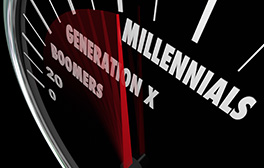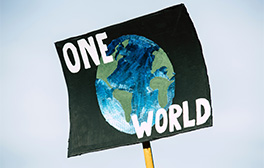Inspire autumn 2022
The latest health and wellbeing news from Towergate Employee Benefits
Welcome to the latest edition of Inspire, our quarterly newsletter, designed to keep you informed about issues and developments that are relevant to your business.
In this edition we discuss whether line managers have finally reached boiling point and if employees are becoming more demanding when it comes to their health and wellbeing expectations. We also look into how our perceptions of different generations manifests in the workplace, and what companies are doing to fight climate change. Plus, find out the latest from the insurers.
‘Line managers should be hugged, not squeezed’
 Line managers are in an opportune position to facilitate great change within the workplace; they’re able to focus their teams on company objectives fed to them from the top, help to create a great workplace environment by providing their team with encouragement and constructive feedback, and lead by example.
Line managers are in an opportune position to facilitate great change within the workplace; they’re able to focus their teams on company objectives fed to them from the top, help to create a great workplace environment by providing their team with encouragement and constructive feedback, and lead by example.
Senior management place a lot of emphasis on line managers taking an active role in shaping and motivating staff – and for good reason: (good) employers recognise that a happy workforce equals a successful business.
At the same time, line managers are under an increasing amount of pressure to facilitate the happiness of their direct reports while also being saddled with more responsibilities than have traditionally been on the line manager’s roster.
In fact, research has shown that line managers may have their plates too full to be able to operate effectively. Research fellow at the Institute for Employment Studies Zofia Bajorek calls this a ‘bandwidth problem’, where managers have more responsibilities than they have time. As a result, line managers may feel they have to prioritise certain tasks while neglecting others, leading to them feeling ‘dumped upon.’1
Interestingly, the health and wellbeing of line managers may have implications for their employees’ health. Research suggests that employees of line managers who reported poor physical and psychological health struggle with poor health themselves. Stressed line managers therefore aren’t lonely islands: when they struggle, their teams struggle, too.
It’s time companies realised that line managers are employees, too, and as employees they also need support.
Line managers are employees, too
It’s the responsibility of senior management and HR to ensure that line managers are getting the support they need, but there’s no one-size-fits-all solution. That’s why we’ve compiled a range of tips below.
- Training. Some research has revealed that line managers are inadequately trained. If this is true for your organisation, targeted training could help to resolve certain issues cropping up as a result of that lack of training2
- Employee assistance programme (EAP). It could be that your line managers need a little prompting to use this service, but an EAP can be an incredibly helpful counselling tool where stressed line managers can discuss whatever is on their mind confidentially, and get the support they need
- Delegating. One of the key problems with modern line management is they’re spread too thin. To help, consider introducing a supervisor directly below them to help with their workload and allow them to focus on what’s most important
- Ensure line managers are reporting to their own managers for 1-2-1s and to receive constructive feedback. Sometimes line managers need someone to lean on, too
- Recognise them. When asked what would most improve their wellbeing, 37% of surveyed line managers said ‘recognition of work well done’ in a formal or informal capacity.’ So, make sure that there are systems in place at your company that allow you to properly thank your line managers – everyone needs to feel seen and appreciated.
References
1. The line management conundrum – let’s hug and not squeeze our line managers | Institute for Employment Studies (IES) (employment-studies.co.uk)
2. CIPD | Annual survey report | Learning and development 2015
3. Legal & General study finds growing pressure on Line Manager wellbeing | Legal & General (legalandgeneral.com)
Are employees getting needier?
 The dynamic between employer and employee has changed markedly in the last few years.
The dynamic between employer and employee has changed markedly in the last few years.
A phenomenon that was catalysed by the pandemic, people in the UK have become considerably more aware of their own mortality – and the mortality of their loved ones – as they make efforts to strike a more fulfilling work-life balance and appeal to their employer for greater work flexibility.
No longer is a generous pay packet enough to keep workers content; more and more, employees are asking for greater work flexibility based around their individual circumstances, e.g., new dog ownership, childcare arrangements, homeworking, etc.
In fact, research has revealed that seven in ten workers believe that their employer has a social responsibility to them, a belief that reflects the idea that ‘employers now have an increased role in [employees’] welfare, wellbeing and overall happiness.’1
What do workers want?
Perhaps the problem is that social responsibility doesn’t mean one thing. Rather, it refers to a shift in attitude that sees employees as individuals with the right to lead a fulfilling work life that suits them as well as the employer.
The world of employee benefits and the huge migration to remote working spells out a large combination of flexible working options and accommodations that may include:
- Flexible working hours, e.g., to accommodate childcare schedules or out-of-work priorities
- Remote working, either partly or all the time
- More extensive company-funded benefits, e.g., fertility support, private medical insurance, grocery discounts
- Accommodations for a pet
- The ability to work from abroad.
There’s nothing to say that the average employer has to accommodate all – or even any – flexible working requests from their workforce. However, with a record number of vacancies on the UK job market waiting to be filled, it’s clear that workers aren’t willing to settle. Now, perhaps more than ever, and in unprecedented numbers, workers are expecting employers to work for them, too.
References
1. Employees believe their employer has a social responsibility to them - Workplace Insight
What’s your generation’s worker stereotype?
 Humans naturally form stereotypes as a way of quickly understanding and organising the world. Naturally, this tendency has made its way into our working lives, and with five generations of people in the workplace for the first time1 – though in general there are only four – there’s plenty of fodder for judgment.
Humans naturally form stereotypes as a way of quickly understanding and organising the world. Naturally, this tendency has made its way into our working lives, and with five generations of people in the workplace for the first time1 – though in general there are only four – there’s plenty of fodder for judgment.
Of course, stereotypes in no way fully represent reality, and we should be aware that we play an active role in how we perceive others as we make efforts to know our colleagues on an individual level.
1. Baby boomers
Born between 1946 and 1964, this generation tends to be the oldest in the workplace. As a result, they generate stereotypes to do with their older age, e.g., that they hate change2 and are inept at using technology.3 There’s also a belief that baby boomers waste their time with ‘endless meetings.’4
As it happens, most of these stereotypes are untrue, and there’s even some evidence to suggest that this generation receive poorer quality training because the trainer has lower expectations of them vs. a younger person.5
Here’s what we do know about baby boomers: they’re competitive, driven, and they value visibility in their work.6
2. Generation X
Born between 1965 and 1980, generation X is also known as ‘the forgotten generation’ because they grew up when significant changes were taking place in society – like rising divorce rates – and they weren’t necessarily considered the top priority. In the workplace, generation X are typically stereotyped as being independent, bleak, sceptical, and challenging of authority.7
But the truth is that, in many ways, generation X combine the best of the traits of the generation preceding them and the generation following them. With a tendency to be well-educated and comfortable with technology, generation X were the first proper advocates for work-life balance.
3. Millennials
Millennials were born between 1981 and 1996, making the youngest of them 26 years-old and the eldest 41 years-old. Of all the generations mentioned here, millennials undoubtedly get the most heat. Stereotyped as lazy, unmotivated, and needy in the workplace, there’s an idea that millennials demand constant feedback and desire lots of 1-2-1 time.
But millennials have a lot to offer. Rather than accepting the traditional 9-5 grind, millennials crave meaningful work.8 Rather than being ‘entitled’, it can be thought of this way: as particularly invested in health and wellness – millennials are also known as the ‘wellness generation’ – as well as counselling and therapy, millennials have the idea that working life should work for the individual the same way the individual works for a company.9
4. Generation Z
As the youngest generation currently in the workplace, generation Z – commonly abbreviated to ‘gen z’ – were born between 1997 and 2015. This generation is stereotyped as having a short attention span, as being fixated on social media, intolerant of face-to-face meetings and having high expectations of their employer.10 Like millennials, gen Z also get heat for supposedly being unwilling to work hard.
But gen Z have the potential to make highly positive contributions to the workplace. According to GetApp, this generation value social responsibility and are ‘breaking away from institutional structures. They don’t just want stability – they want flexibility.’ Gen Z aren’t afraid of appearing unrealistic as they dare to dream of how the world could look like as they use their voice to strike meaningful change.
While there may be some surface-level differences between the different generations in the workplace that aren’t fully based in fact, the truth is that a multi-generational workforce is considered highly valuable. When multiple different generations are represented in the workforce, there’s more diversity of thought, more perspectives and life experience and therefore greater problem-solving abilities, a wealth of mentoring opportunities, and room for employees to build meaningful and unique relationships.11
Resources
1. Managing People from 5 Generations (hbr.org)
2. Overgeneralizing the generations (apa.org)
3. How the 'Baby Boomer' Label Can Lead to Discrimination - Pacific Standard (psmag.com)
4. Millennials vs. Boomers: 5 Stereotypes That Aren't True (Mostly) (forbes.com)
5. Just How Different Are Millennials, Gen Xers, and Baby Boomers at Work? (hbr.org)
6. From Boomers to Zoomers, Here Are the Characteristics of the Different Generations at Work (getapp.com)
7. Generations at Work: Stereotypes and Facts (informationweek.com)
8. What Does Millennial Loyalty Look Like In Today’s Workplace? (forbes.com)
9. Are Millennials More Than an Entitled Generation? | Psychology Today United Kingdom
10. 5 ‘Negative’ Stereotypes About Gen Z That Will Actually Help Them in the Workplace - RippleMatch
11. Multigenerational Workforce: Benefits, Challenges, and 9 Best Practices (aihr.com)
How far would your business go to fight climate change?
 US outdoor clothing retailer Patagonia made headlines when the owner Yvon Chouinard announced he was giving his company away to fight climate change. ‘Earth is now our only shareholder’ was the poignant statement published on the company’s website.
US outdoor clothing retailer Patagonia made headlines when the owner Yvon Chouinard announced he was giving his company away to fight climate change. ‘Earth is now our only shareholder’ was the poignant statement published on the company’s website.
Long known for its ethical standpoint on the environment and sustainability, with initiatives like taking back old Patagonia garments for recycling and using organically grown cotton from Fair Trade farmers in its clothes, Patagonia continues to wear its company values on its recycled cotton sleeves.
The PR impact of this particular story, and the exponential rise in brand awareness this will have created for Patagonia, could suggest that a unique ESG standpoint like this is nothing but good for business. The company’s employees will undoubtedly be feeling proud to be part of a community that makes a real positive difference.
ESG topping the agenda
Environmental and social governance (ESG) has been at the top of the agenda for many companies for over a decade and continues to gain momentum. In the UK, improving the air that we breathe has never been such a focussed goal, with the government aiming to decarbonise the economy to meet our net zero status by 2050.
Net zero buildings, electric vehicles, a green supply chain, health and well-being programmes for a diverse workforce and investing in improving local community are just a handful of the things that may come to mind when considering ESG in business. It’s the reporting on the initiatives that can cause issues however, as if companies don’t live up to their promises, litigation can come knocking at the office door.
5 ESG propositions from well-known brands
There have been numerous reports about how ESG metrics influence buying decisions, particularly amongst younger consumers. It is only right that those companies making pledges and doing the right thing present their initiatives for the world to see. Here are five examples from well-known brands in different industries:
Pret a Manger - https://www.pret.co.uk/en-GB/sustainability
JCB - https://www.jcb.com/en-gb/about/sustainable-solutions
Barclays - https://home.barclays/sustainability/esg-resource-hub/
Meta (Facebook) - https://investor.fb.com/esg-resources/default.aspx
Audi - https://www.audi.com/en/company/sustainability.html
Beware of the BHAGs
Patagonia’s announcement is likely to have a ripple effect in terms of social conscience and encourage some business leaders and ESG advisory boards to ask, ‘what else can we WE really do to make a difference?’ There is a danger, however, in this unchartered territory that the more momentous the ESG themed BHAGs (big hairy goals), the greater the chance of failure.
Failing to live up to your ESG credentials is possibly worse than not making any promises at all. However, saying that, it is usually now a requirement from investors, customers, employees and regulators to show how your business is making a difference. Towergate’s own regulator, the FCA, has recently announced it is recruiting a brand new ESG advisory committee to help the board reach its own obligations.
A claim doesn’t have to be justified to initiate costly legal defences
ESG claims made on a website, in a brochure or prospectus or in reports must be backed by reliable management information or a company may risk litigation. Litigation can come from almost anywhere – employees, shareholders, creditors, regulators, customers, competitors, the Government or anyone else who feels they have suffered a loss arising from the actions of a director or officer.
It is also important to remember that a claim doesn’t have to be justified and factual to initiate costly legal defences. ESG litigation can impact the reputation and goodwill of a company and cause indirect loss due to the time and level of attention required to manage the relationship with employees, customers and stakeholders.
Financial loss can occur directly as a result of fines, damages and expenses associated with the claim as well as loss of sales and decline in custom.
Protecting your company
ESG factors are increasingly being taken into account by underwriters when considering Directors & Officers liability insurance. D&O insurance is designed to protect directors and officers from claims arising from decisions they make and actions they take. D&O underwriters are increasingly recognising the benefits of a company having a strong ESG risk management framework to mitigate the risk of environmental litigation.
If a group of claimants (internal or external) decide to sue Directors having suffered injury or damage as a result of their alleged failing, this will incur expensive defence costs. Lawsuits can last for years and the costs associated with them are rising so it is essential that companies have good D&O insurance in place.
Continuous education on this topic is key for directors and officers to ensure that a company knows:
- How much D&O coverage it needs
- What and who is covered
- What and who is not covered
D&O forms part of a company’s Management Liability Insurance. A specialist from Towergate Insurance Brokers can advise on all aspects of MLP.
Latest news from the insurers
 Have you heard the latest from the insurers?
Have you heard the latest from the insurers?
Here are the most recent updates from some of the key providers, including Aviva, AXA, Bupa and Simplyhealth, and Vitality.
Aviva
30 August 2022 - 55-64s most likely to feel ‘up to their neck in debt’ as financial squeeze bites
Aviva finds that more than two in five (43%) of 55-64 year olds surveyed admit they are ‘struggling financially’ or are ‘up to their neck in debt’ against an average of 35% of people surveyed in the 55+ age group.
24 August 2022 – Work-life balance overtakes salary post-pandemic
New research suggests that workers are more attracted to their current role for the work-life balance rather than the salary.
AXA
18 August 2022 – AXA UK warns of serious fire risk of lithium batteries in e-bikes and scooters
AXA UK and the London Fire Brigade warn that improper storage and damage to the lithium-ion batteries in electric bikes and scooters can result in devastating fires.
22 July 2022 – AXA UK introduces domestic abuse policy, providing additional paid leave to employees in need
AXA UK has launched a new domestic abuse policy and support hub. The policy offers up to five days paid leave to help support people when they need it most.
Bupa
15 June 2022 – Being disruptive is the best way to get things done
Over 700 people from 16 countries joined the Bupa B Disruptive global hackathon. For 48 hours they worked together to help Bupa come up with answers to customers’ toughest challenges.
10 June 2022 – The plastic pollution crisis
Approximately 400 million tonnes of plastics are produced each year, with the polymers found in plastic lasting hundreds of years.
Simplyhealth
11 July 2022 – Simplyhealth becomes certified B Corporation
Simplyhealth is the first insurer of its kind to be awarded B Corp status, a certification that rewards companies who are dedicated to being a positive and regenerative force for the environment and the community.
26 May 2022 – Simplyhealth makes second significant investment of 2022 by taking stake in Ampersand Health
This collaboration will help to accelerate the adoption of digital therapeutics in the UK, reducing outpatient appointments and improving health outcomes.
Vitality
27 July 2022 – Vitality research shows increased productivity is the main motivation for health and wellbeing policies at work
Vitality has released new research revealing that business leaders believe the robust mental and physical health of their employees is key to rising productivity levels and profitability.
8 June 2022 – Vitality unveils first ever Health Claim Insights Report
The report details compelling insights from its claims data and key trends across the private medical insurance market.
